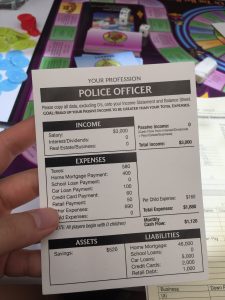As some of you may know, I play Robert Kiyosaki’s Cashflow game every weekend with a bunch of awesome people. It’s such a good way to learn the basics of personal finance and investing. Each time I play it, I learn something new.
What’s this Cashflow game?
Here’s a quick overview of how the game works:
You choose a profession and get given numbers for your income, expenses, assets and liabilities.

The first aim of the game is to “get out of the rat race” by increasing your monthly passive income to more than your monthly expenses, meaning you ain’t gotta work to fund your lifestyle anymore.
To do this, you need to build up assets that will provide you with this ongoing passive income. This can be done through a combination of buying properties and investing in businesses that have positive cash flow every month.
Once you’ve successfully escaped the rat race, the next aim is to build up your monthly cash flow to a certain amount, or to “buy your dream”, once again investing in various businesses and ventures. Many people play with their real-life dreams of owning a certain property or having a certain lifestyle.
The best thing about this game is that you can see the immediate impact of your actions on your financial situation.
Learning how to get comfortable with debt
One of the key things I learned early on is that I need to get comfortable with using debt. The first few times I played, I found myself very reluctant to borrow money from the bank because I had no idea what it meant. And when you don’t understand something, you tend to stay the hell away from it. 🤷🏻♀️
Well, sometimes ignorance is not bliss. I realised that this seriously limited my ability to progress through the game quickly.
One time, I played as the janitor, which had pretty low cash flow. I tried to play it safe investing in shares with the small amount of cash I had, hoping for a payout, which didn’t eventuate cos the sharemarket was absolute crap that game.
This meant that I missed out on good property deals because I thought that I couldn’t bloody afford any of them until I got a heap of cash from selling my shares. 😒
This pretty much reflected my real life because I’d never gone anywhere near debt. I don’t even have a credit card. After that game, I told myself that I just gotta learn how to freakin’ use goddamn debt so I don’t get stuck in the rat race for eternity. 😫
The next game, I finally took the plunge and holy crap, it was so eye-opening. I could see the impact of taking on debt play out on my financial statements. It just reduced my monthly cash flow by a little bit to make the interest payments, but as soon as I sold the property there was a SHIT TON of cash coming in (waaaaay more than what I put in for the down payment) and it was like HOLY CRAP this debt shit is powerful. 😱
And just like that, I opened up a whole realm of possibilities. Now I look for opportunities to use debt all the damn time so that I can get into good deals. 🤑
An example deal

Here’s an example: Went 50-50 on this deal with another player where we both had to put in $2,500 for the down payment. I had to borrow $500 since I only had $2,000 on me. At an interest rate of 10%, this meant an extra $50 in monthly expenses.
We ended up selling it very soon after for $55,000, which after deducting the mortgage of $35,000 meant $20,000 profit, so $10,000 for each of us. That’s 4x our initial investment. Sure, the numbers and timeframe might not be realistic, but you get the point.
How about in real life?
OKAAAY so it’s all well and good doing it in the game, which is as simple as writing down some numbers on paper and being like HOLY CRAP
But how easy is it to do in real life? As it turns out, it’s not that easy. LOL. Like, you can’t just walk into a bank and be like yo, gimme some money so I can snap up some properties and get a huge-ass payday… 🙄 Especially since you’ll probably be borrowing way more than $500. 😂
But just getting comfortable with the idea of debt is a good start. Of course, you’ll have to speak with financial professionals to figure out what is best for your situation.
If you’re getting into property investments, I’d recommend gathering together a solid team e.g. a real estate agent, mortgage broker, accountant and lawyer who all know their stuff and will act in your best interests.






